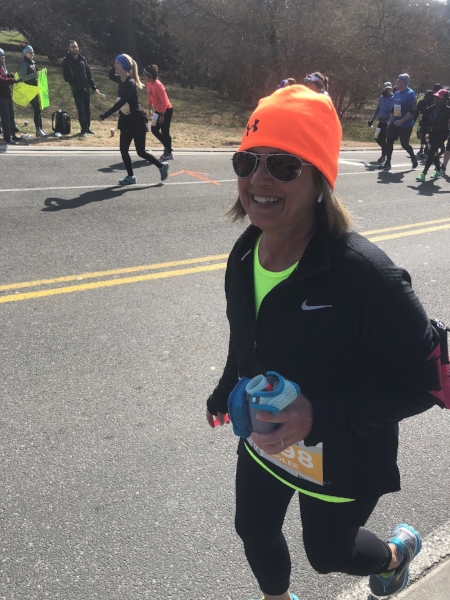When helping yourself means reaching out to others for help
Does my fitness journey define me? There's my book, on the shelf at Politics and Prose in Washington, D.C.! For now you can find it there under Health, but you might also find a copy under Memoir/Biography. If you're in Washington, D.C., I'll be speaking about the book at Politics and Prose at the Wharf on March 19 at 7 pm
“How would you feel about categorizing your book as self-help or personal growth?”
I was having a telephone conversation with an editor at a publishing house about my memoir. I had finished the manuscript in August and had been pitching the project to literary agents and publishers, taking online workshops on how to publish a book, and tweaking the pages based on feedback from readers.
I was never sure whether it was a good idea to call my book a memoir. I’m always visiting bookstores to look at what’s on the memoir shelf or the self-help, psychology, or personal growth shelves, so I get why she was asking the question.
It’s my fitness journey, that’s true, but I wouldn’t say fitness defines me.
“Sure,” I said, “I’m good with that.”
She told me to take the weekend to think about it, and, if I agreed, to re-craft the proposal as a self-help title.
If we’d had the conversation in person, the editor would have seen that I was smiling.
Not just because I was having a meaningful conversation with an editor who was planning to submit my project to her company’s editorial board for approval.
But because I’d been thinking about and exploring what I consider to be the irony of self-help since setting out on my fitness journey in early 2014.
Here’s the Merriam-Webster definition of self-help:
The action or process of bettering oneself or overcoming one’s problems without the aid of others; especially: the coping with one’s personal or emotional problems without professional help.
This is so interesting to me because there is an entire section in the bookstore devoted to self-help! On the shelves are books covering every topic you can think of promising to help you do or be better at whatever. These books are written by experts but also by regular people, like me, who've lived the journey, who've got a tip or two and who might make you feel less alone, less out there on your own.
At least for me, at the core of self-help is, in fact, knowing when to reach out for help. And having the confidence and the courage to actually do it. To own it.
So often, especially related to weight loss and fitness, we'll say something like, "I know what I need to do, I just don't do it."
Sound familiar?
In my experience, although we might be the ones to ask for directions, it's men who don't think twice about asking a coach or a trainer for help when it comes to fitness and exercise.
It's a big deal for women like me to admit we might be out of our league when it comes to the complex system of muscles and tissues that snake around our skeletons. At the tiniest strain, we stop moving. And then it might take weeks or months to see a physician when all we needed to do was seek out the guidance of a skilled health coach or trainer or physical therapist or even nutritionist. At one point early on in my training I was consulting all of these specialists, and including sports medicine physicians, and was utterly amazed at the new stuff I was learning. And especially at how little I knew about any of this. How stupid I felt.
Remember Reuel Tizabi? My adorable first trainer who's contributed two chapters in my book? He was 26 when I first started working with him. It took an enormous amount of trust for me to be able to reach out to him for guidance even though he was exactly the right person for me to be talking with about my exercise goals.
When my kids were little both of them were passionate about the performing arts, and I rarely hesitated getting them set up with voice teachers, acting coaches, and dance lessons. Some of my friends and even my sisters took their kids to area ice rinks at 4 or 5 in the morning before school or on Saturdays so they could play ice hockey. Or soccer. In California I would drive such vast distances and even across mountain ranges to get Mia and Adin to a dance competition or to a rehearsal that on the East Coast I would have been driving the equivalent of Baltimore to New York City. Sometimes 5 days a week.
So for moms we've also got that knee-jerk reaction whenever we think about doing something like that for ourselves, to make ourselves better or happier or healthier. Or even to have fun.
We don't want to put ourselves first and in fact we might even feel guilty if we start to spend real money on exercise or races we have no intention of winning or see mounting co-payments for physical therapy. Speaking for myself, I know I've got challenges ahead as both my body and the world changes but my big obstacle in any of this is continuing to get comfortable knowing when to ask for help.
And then to do it.
You, too? Let's keep talking about this.
See you next time!
Halfway into Saturday's Rock n Roll Half Marathon in Washington, D.C., I was just starting to feel a stabbing pain in my right heel. By the finish, I could barely put weight on my foot. Later, I read up on plantar fasciitis and learned it's often caused by tight calves and achilles tendons. After stretching and massaging mine I'm feeling much better, but no running for at least a week. Hello pool!

